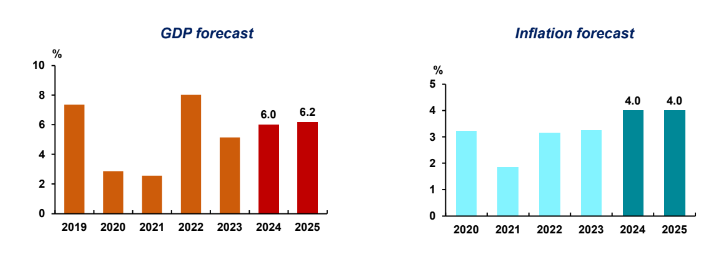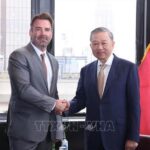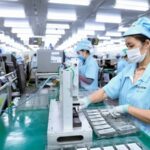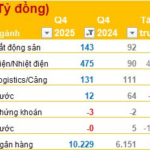In a recent conference on September 25, the Asian Development Bank (ADB) provided an encouraging update on Vietnam’s economic development. ADB projected Vietnam’s economic growth (GDP) to reach 6% in 2024, with a steady improvement to 6.2% expected for the following year.
Vietnam’s industrial sector, which is largely focused on exports, remains the key driver of this growth. The bank forecasts the industry to expand by 7.3% in 2024 and reach 7.5% in 2025. Additionally, the construction sector is anticipated to maintain its growth trajectory, provided that major infrastructure projects stay on schedule.
Foreign direct investment (FDI) in Vietnam has also shown positive signs. In the first eight months of 2024, registered capital reached $20.5 billion, marking a 7% increase compared to the same period last year. Notably, 77% of this FDI capital was invested in export-oriented manufacturing sectors, contributing significantly to the country’s export growth. ADB predicts that FDI will continue to rise in Vietnam, providing strong support for exports.
Mr. Shantanu Chakraborty, ADB’s Country Director for Vietnam, affirmed the country’s economic resilience: “Vietnam’s economy demonstrated a robust recovery in the first half of 2024 and continues to forge ahead despite global uncertainties. This steady recovery is fueled by improving industrial production and a strong rebound in trade.”

On the topic of inflation, ADB expects a slight increase of around 4% for both this year and the next. However, the bank’s experts caution that geopolitical tensions, including conflicts in the Middle East and between Russia and Ukraine, pose risks that could impact oil prices and heighten inflationary pressures.
Mr. Nguyen Ba Hung, ADB’s Principle Country Economist, while acknowledging the positive trajectory, highlighted several risks that could hinder Vietnam’s growth. These include weak demand from major economies, geopolitical tensions, and uncertainties associated with the upcoming U.S. elections, all of which could disrupt trade and negatively affect Vietnam’s exports, production, and employment.
Vietnam’s exports, despite recent successes, face intense competition due to shifts in global trade and value chain restructuring, particularly in industries like textiles and electronics. Additionally, geopolitical tensions and rising protectionism present significant challenges to the country’s economic outlook.
To sustain its economic momentum, Vietnam must prioritize macroeconomic stability through a harmonious blend of fiscal and monetary policies. Mr. Hung emphasized, “Strengthening domestic demand calls for stronger fiscal stimulus measures, such as expediting public investment disbursement, coupled with maintaining low-interest rates. Given stable prices and weak domestic demand, coordination between fiscal and monetary policies is crucial for economic recovery.”
While Vietnam’s National Assembly has approved a continued 2% reduction in value-added tax (VAT) until the end of 2024, resulting in a slight deficit for the state budget, slow budget spending implementation persists. Therefore, ADB experts recommend prioritizing fiscal stimulus measures to address this challenge.
To further bolster Vietnam’s economy, accelerating the disbursement of public investment capital is essential. By directly supporting sectors such as construction and manufacturing, this action will create more jobs and drive economic growth in the near future.
The Tech Giants and American Investment Funds: Expanding Horizons in Vietnam
On the sidelines of the 79th Session of the UN General Assembly in New York, General Secretary and President To Lam held a meeting with former Google CEO Eric Schmidt, along with leading technology companies and investment funds from the US and beyond. The gathering included representatives from Apple, Meta, Super Micro, and investment giants Blackstone and Warbug Pincus.
The Prime Minister Outlines Six Significant Impacts of the Fourth Industrial Revolution Center in Ho Chi Minh City
On the morning of September 25, Prime Minister Pham Minh Chinh attended the inauguration of the Center for the Fourth Industrial Revolution (C4IR) in Ho Chi Minh City, as part of his participation in the 5th Ho Chi Minh City Economic Forum. The Prime Minister also held a working session with the Center’s founding members, emphasizing the importance of this initiative in driving Vietnam’s digital transformation and economic growth.
“A Vision for Prosperity: Elevating Dong Nai’s Economy to the Forefront of Vietnam”
Working alongside the leadership of Dong Nai province, Prime Minister Pham Minh Chinh proposed that the province should embrace the spirit of “3 pioneers” and focus on 8 key tasks. The aim is to propel Dong Nai to the forefront of economic development in Vietnam, envisioning it as a province renowned for its civility, modernity, and high income, placing it among the nation’s elite.



















